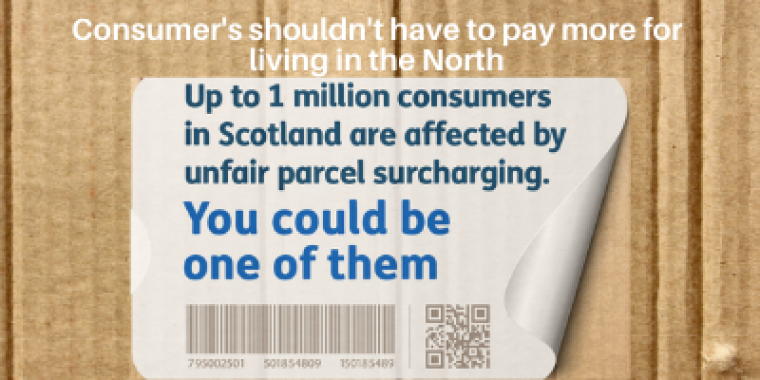Living in the North

As the Coronavirus pandemic and subsequent lockdowns continues to impact on our day to day lives, we are all finding new ways to adapt.
For many of us, these adaptations include ordering much of what we need over the internet. While online shopping has become increasingly popular over recent years, with an estimated 87% of UK shoppers buying goods or services online (2016), the coronavirus crisis has accelerated the move to online shopping. This trend looks likely to continue for the usual key shopping dates of Black Friday, Cyber Monday and in the run up to Christmas.
With this mind, it is increasingly important that consumers know their rights when buying things online. For too many consumers and businesses, who are increasingly reliant on online services, prices can be unfair or there can be hidden costs. Sometimes consumers are refused delivery altogether just because of their postcode.
Along with other partners, Citizen Advice Scotland (CAS) is working to ensure that consumers are aware of their rights in relation to online shopping and delivery of goods.
National Consumer Week is an annual UK-wide campaign which aims to raise awareness of consumer issues and this year takes place from 16 - 22 November. This year’s campaign focuses on raising awareness of consumer rights when shopping online. It aims to help people understand the steps they can take to protect themselves when shopping online, for example from potential scams or dubious retailers, and help them to know what action they can take when something goes wrong, for example, if their purchase hasn’t been delivered.
For instance, if something you ordered hasn't arrived, under the Consumer Rights Act, you can ask the seller to deliver the item again if it wasn’t delivered within a reasonable time - usually within 30 days.
One issue that particularly affects Scottish consumers is parcel surcharging. An issue that CAS has long worked and campaigned on, having first been raised by Skye and Lochalsh Citizens Advice Bureaux
Research by Citizens Advice Scotland has found that up to one million Scottish consumers may be affected by parcel surcharging: paying unfair high prices for delivery of items ordered online. It’s clear that consumers remain dissatisfied with the current parcel delivery landscape and see it as being unfair and discriminatory.
The issue often affects anyone ordering goods to be delivered north of the central belt, including those in Perthshire, Aberdeenshire, Moray, Argyll and Bute, the Highlands, and the Scottish Islands.
As a Highlander, this is something that I have first-hand experience of myself. During lockdown, for example, myself who lives in Edinburgh and my mum living in the Highlands made similar orders. Each time my mum is charged extra for delivery because she lives near Inverness. Over the years, higher delivery charges for those based in the north has led us to question whether there was a sea near Dalwhinnie that separated us from the south of Scotland!
CAS have also heard from one consumer in Aberdeenshire, who purchased a new greenhouse. The supplier advertised "FREE Delivery within 30 weeks. Some Scottish postal areas attract an additional delivery charge." That additional charge came to £550.00 being added to the bill! When asked why this enormous charge was added, the delivery company stated that they charge an additional £500 for deliveries north of Grangemouth.
No-one should face unfair pricing based on where they live.
At CAS, we are working hard to ensure that people in Scotland know their rights in relation to online shopping and deliveries. That’s why we support and promote campaigns such as National Consumer Week.
Various Citizen Advice Bureaux across Scotland are campaigning over the course of this year for fairer deliveries to raise awareness about surcharging on parcels, aiming to raise awareness of the detriment to consumers and SMEs caused by surcharging and the lack of transparency around the use of delivery surcharges.
CAS are also working with Scottish Government to improve awareness and encourage best practice by retailers and delivery companies. Our aim is for all consumers and businesses to receive fair delivery services, no matter their location. For example, it may be possible to reduce the costs involved in delivering parcels in more remote areas through cooperation between parcel delivery operators and the public sector.
If you're looking for advice on what your consumer rights are when buying online and what you can do if you have a problem, you can always access support on our advice pages.
As we go into the season of spending hard-earned cash on presents for our loved ones, it is vital that the people of Scotland can all make online purchases and receive their goods safely and at a fair price, a sentiment we can all share as we go into the season of good will to all.
by Andrew Fraser, policy officer in the CAS Strong Communities team.
This article was first published in the Herald on 18 November 2020.